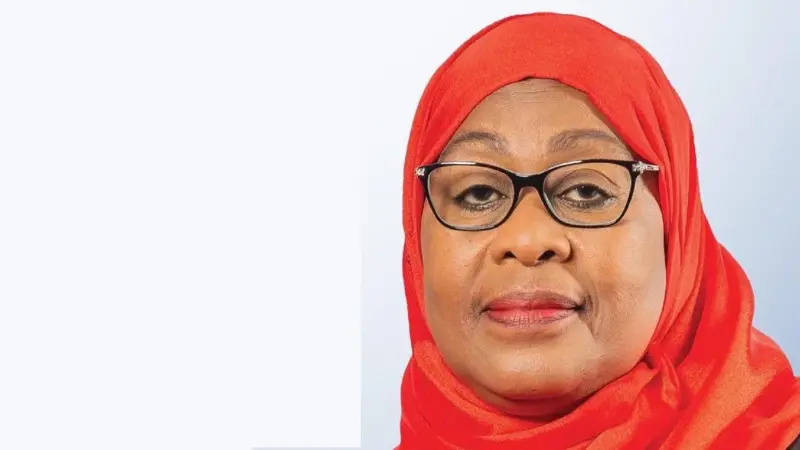President Samia Suluhu to Take Oath in a Private Ceremony as She Begins a New Chapter in Tanzania’s Leadership

The Chairperson of Tanzania’s Independent National Electoral Commission (INEC), Jacobs Mwambegele, on Saturday officially declared Samia Suluhu Hassan the duly elected President of the United Republic of Tanzania, representing the ruling party, Chama Cha Mapinduzi (CCM).
While the announcement sounded routine, it marked a historic reaffirmation of leadership, confirming President Samia’s reelection after the October 20 general elections. She now prepares to serve a second five-year mandate at the helm of the East African nation.
A government statement aired on Tanzania Broadcasting Corporation (TBC) indicated that the inauguration will take place on Monday, November 3, at the military grounds in Dodoma, the country’s political capital.
Unlike past ceremonies, members of the public will not be permitted to attend, with the entire event scheduled to be broadcast live on TBC.
Among foreign dignitaries expected to attend is Burundi’s President Évariste Ndayishimiye, whose office confirmed his departure for Dodoma earlier on Sunday.
According to INEC, President Samia secured a resounding victory, claiming 97.66% of the vote the largest winning margin in Tanzania’s history. Of the 37 million registered voters, about 31 million voted in her favor, in an election that recorded 87% turnout, despite reports of unrest in several regions, particularly Dar es Salaam, which was placed under a temporary curfew during the vote.
Who Is Samia Suluhu Hassan?
Born in 1960 on the islands of Zanzibar, Samia Suluhu Hassan made history as Tanzania’s sixth president and the second leader to come from the archipelago, following Ali Hassan Mwinyi, who governed from 1985 to 1995.
A career public servant and academic achiever, she holds a Master’s degree from the University of Manchester (UK) and additional qualifications earned through collaboration between Southern New Hampshire University (USA) and the Open University of Tanzania.
Her public career began in 1988 in Zanzibar’s Ministry of Regional Administration, before taking a position with the World Food Programme (WFP). By the mid-1990s, she had risen to oversee international organizations operating within Zanzibar.
From Local Politics to National Leadership
Samia entered the political arena in 2000, when she was appointed to the Zanzibar House of Representatives under CCM, later serving as Minister for Youth, Women, and Children.
During her tenure, she gained recognition for lifting a controversial law that barred young mothers from returning to school a progressive policy applauded by education and gender advocates.
She later served as Minister for Tourism and Trade in 2005, before transitioning to the National Assembly in 2010, representing the Makunduchi constituency. Her victory with more than 80% of the vote earned her appointment by then-President Jakaya Kikwete as Minister of Union Affairs, handling delicate relations between Zanzibar and the mainland.
Her national profile grew significantly in 2014, when she became Vice-Chairperson of the Constituent Assembly, tasked with drafting a new constitution. Her poised and pragmatic leadership during heated televised debates elevated her public image and earned her wide respect.
In 2015, presidential candidate John Pombe Magufuli selected her as his running mate, making Samia Tanzania’s first female Vice President. Following Magufuli’s death in 2021, she constitutionally assumed the presidency, becoming the first woman to lead Tanzania and the first elected female head of state in East Africa’s history.
A Leader of Consensus and Reform
Upon assuming office, President Samia distanced her administration from some of her predecessor’s hardline policies most notably on COVID-19. She authorized vaccination campaigns and restored cooperation with global health agencies.
She also reopened Tanzania’s political space, allowing opposition rallies and public assemblies previously restricted under Magufuli’s rule.
Political analyst Ezekiel Kamwaga described her approach as “a cautious but vital step toward restoring democratic balance,” adding that “open dialogue, even when uncomfortable, is essential for any democracy to thrive.”
However, her administration has faced criticism from human rights organizations, which accuse it of occasionally silencing dissent and limiting political participation. President Samia has pledged to address those concerns and has emphasized plans to reform national laws to align with Tanzania’s “changing democratic environment.”
The Source of Her Political Strength
Those who have worked closely with President Samia often describe her as soft-spoken yet strategically assertive.
Former cabinet minister January Makamba, who collaborated with her between 2015 and 2020, observed: “She may project calmness, but her decisiveness is remarkable. She listens thoroughly before making any move and once she decides, she doesn’t waver.”
Her compassion and courage were evident in 2017, when she paid a hospital visit to Tundu Lissu, an opposition lawmaker recovering in Kenya after surviving an assassination attempt a gesture few in government dared to make at the time.
Balancing Power and Family
Away from politics, Samia is married to Hafidh Ameir, and the couple has four children, including Wanu Hafidh Ameir, currently serving as a Member of Parliament.
Reflecting on her personal journey, she once remarked: “Politics has never been an easy road. Balancing family life, studies, and public duty demands endurance. Yet, every challenge has strengthened my resolve.”
A Legacy of Quiet Transformation
As she prepares to be sworn in for another term, President Samia Suluhu Hassan stands as a trailblazer in Tanzanian politics a leader whose calm demeanor conceals steely resolve.
Her upcoming private inauguration may differ from traditional state celebrations, yet it symbolizes continuity, stability, and a renewed national vision under a leader who has steadily reshaped the face of governance in East Africa.

SUBSCRIBE TO OUR NEWSLETTER












